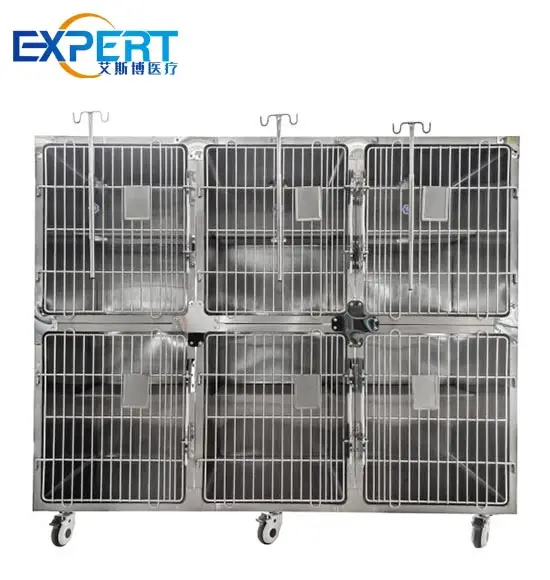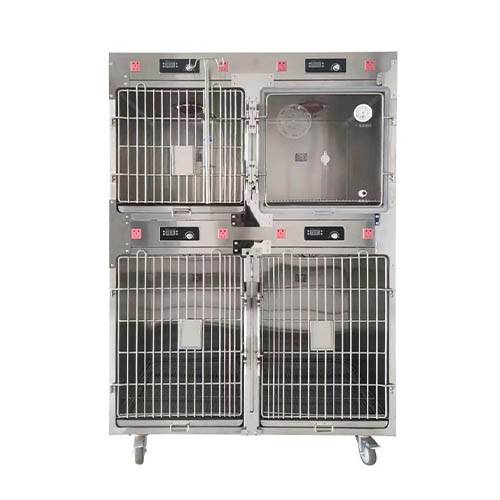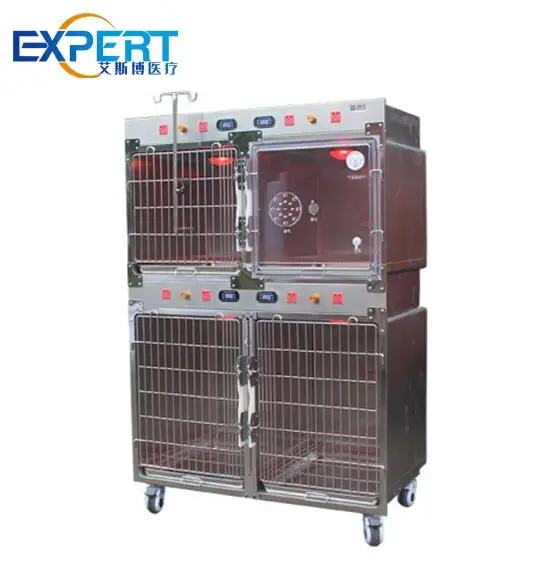Endereço
304 North Cardinal St.
Dorchester Center, MA 02124
Horas de trabalho
Segunda a sexta: 7h00 - 19h00
Fim de semana: 10h - 17h

In the ever-evolving field of veterinary medicine, the choice of equipment is crucial for ensuring high-quality animal care. Among the essential equipment in any animal hospital, veterinary cages play a vital role in the well-being of pets. One material that has gained significant popularity in this context is stainless steel. Stainless steel veterinary cages are becoming the preferred choice for veterinary practices worldwide due to their numerous benefits. This blog will delve deep into the various advantages of using stainless steel cages, highlighting aspects such as durability, hygiene, comfort, and more.
One of the standout features of stainless steel veterinary cages is their exceptional durability. Unlike plastic or wood, stainless steel is inherently resistant to rust, corrosion, and general wear and tear. This resilience not only ensures that the cages can withstand the rigors of daily use but also maintains their structural integrity over time. Animal hospitals often operate in high-stress environments where equipment must endure constant handling, cleaning, and occasional impacts. Stainless steel cages can last for years, significantly reducing the need for replacements.
| Recurso | Aço inoxidável | Plástico | Wood |
|---|---|---|---|
| Durabilidade | Alto | Moderado | Baixo |
| Resistência à corrosão | Excelente | Pobre | Pobre |
| Vida útil | 10+ years | 3-5 anos | 1-3 years |
While the initial purchase price of stainless steel veterinary cages may be higher compared to their plastic counterparts, they offer significant long-term savings. Their durability leads to fewer replacements and lower maintenance costs over time. Additionally, the decreased need for repairs and cleaning supplies further enhances their cost-effectiveness, making them a smart investment for animal hospitals aiming for sustainability and efficiency.
Maintaining a hygienic environment is paramount in veterinary care, where the risk of infection can pose serious threats to animal health. Stainless steel cages are non-porous, allowing for straightforward cleaning and disinfection. Surfaces that do not absorb bacteria or stains are essential for maintaining a sterile environment. Veterinary practices can employ various cleaning agents without worrying about damaging the cages, ensuring thorough sanitation after each use.
The risk of cross-contamination in veterinary hospitals can have dire consequences. Stainless steel veterinary cages significantly mitigate this risk due to their smooth surfaces that are less conducive to harboring harmful pathogens. By investing in these cages, animal hospitals can foster a safer environment for both animals and staff, reducing the likelihood of outbreaks of diseases and infections.
Animal welfare is a top priority for veterinary practices, and the design of stainless steel veterinary cages reflects this commitment. Many stainless steel cages feature rounded edges and smooth surfaces to prevent injuries and ensure a more comfortable environment for pets. Additionally, the availability of various bedding options within these cages allows for personalized comfort tailored to each animal’s needs, contributing to their overall well-being during their hospital stay.
Temperature control is another critical factor in the comfort of animals. Unlike plastic cages, which can heat up quickly under certain conditions, stainless steel maintains a more stable and comfortable environment. This temperature regulation is vital for recovering animals who may be sensitive to extreme temperatures, helping them feel safe and secure during their time in the hospital.
Every animal hospital has unique requirements based on the types of animals they treat and the services they offer. Stainless steel veterinary cages can be easily customized to meet specific needs. This includes various sizes, configurations, and features such as sliding doors or removable trays. Customization ensures that each cage serves its intended purpose effectively, accommodating a wide range of animals from small pets to larger breeds.
The versatility of stainless steel cages is another significant advantage. Whether housing small mammals, exotic animals, or large dogs, these cages can be tailored to fit the needs of various species. This flexibility allows veterinary practices to provide the appropriate care for each animal, enhancing their operational efficiency and service quality.






Safety is paramount in animal hospitals, and stainless steel veterinary cages offer robust construction that can withstand the physical demands of housing animals. Their sturdy design prevents accidental breakouts and escapes, providing peace of mind for both veterinary staff and pet owners. In high-stress situations, such as emergency care, the reliable construction of these cages ensures that animals remain secure.
In addition to sturdy construction, many stainless steel cages come equipped with advanced locking mechanisms that are escape-proof. This is critical in a busy veterinary environment where the safety of animals is a top priority. The assurance that animals cannot easily escape or injure themselves within their confines allows staff to focus on providing exceptional care without unnecessary distractions or concerns.
The overall appearance of a veterinary facility significantly influences client perception. Stainless steel veterinary cages convey a sense of professionalism, cleanliness, and modernity that can instill confidence in pet owners. When clients see that a facility invests in high-quality equipment, they are more likely to trust the care their pets receive.
The sleek and shiny surfaces of stainless steel cages not only look appealing but also contribute to a more organized and aesthetically pleasing environment within the hospital. A modern appearance is essential in attracting clients and fostering a positive reputation in the community, ultimately contributing to the growth and success of the veterinary practice.
Choosing stainless steel veterinary cages is not just about immediate benefits; it’s also an environmentally responsible decision. Stainless steel is fully recyclable, making it a sustainable choice compared to plastic alternatives that contribute to landfill waste. By opting for stainless steel, animal hospitals demonstrate their commitment to environmentally friendly practices.

Investing in durable and recyclable materials aligns with the growing emphasis on sustainability in the veterinary field. Animal hospitals that adopt sustainable practices can reduce their environmental footprint and promote a positive image within their communities, appealing to environmentally conscious pet owners.
In conclusion, the advantages of using gaiolas veterinárias de aço inoxidável in animal hospitals are comprehensive and multifaceted. From their unmatched durability and ease of cleaning to the comfort and safety they provide for animals, these cages emerge as the optimal choice for veterinary practices. By investing in stainless steel, animal hospitals not only improve their operational efficiency but also elevate the standard of care for their patients. Ultimately, the transition to stainless steel veterinary cages represents a commitment to excellence in veterinary medicine.
P: O que são gaiolas veterinárias de aço inoxidável made of?
A:Stainless steel cages are constructed from high-quality stainless steel alloys that resist rust and corrosion, ensuring long-lasting durability. This material choice is essential for maintaining a safe and hygienic environment.
Q:How do stainless steel cages compare to plastic cages?
A:Stainless steel cages offer superior durability, ease of cleaning, and reduced risk of cross-contamination compared to plastic cages. They are also more resistant to wear and tear, making them a more reliable option for veterinary hospitals.
P: São stainless steel cages more expensive?
A:While the initial cost of stainless steel cages may be higher, their longevity and reduced maintenance costs make them a cost-effective investment in the long run. Veterinary practices often find that the initial investment pays off over time through fewer replacements and repairs.
Q:Can stainless steel cages be customized?
A:Yes, many manufacturers offer customizable options for stainless steel veterinary cages, allowing for various sizes, configurations, and features tailored to specific needs. This customization ensures that each cage is designed for optimal functionality.
Q:How often should stainless steel cages ser limpo?
A:It is recommended to clean stainless steel cages daily or after each use to maintain hygiene and prevent the spread of infections. Regular cleaning practices help ensure a safe environment for all animals.
